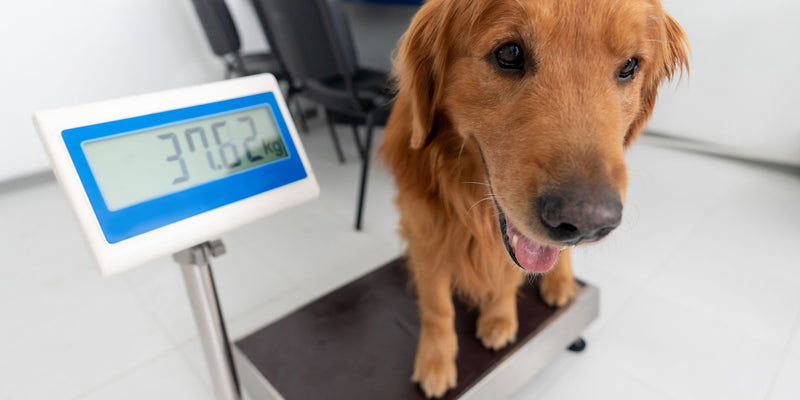Paws for Thought: Recognising Signs of an Overweight Dog
January 01, 2024

Our canine companions come in all shapes and sizes, each with their own unique charm. While a little extra weight might seem harmless, it's crucial to recognise when our furry friends might be carrying a bit too much. In this blog, we'll explore how to tell if your dog is overweight and why maintaining a healthy weight is vital for their well-being.
1. The Ideal Weight Range:
Understanding the ideal weight range for your dog's breed is the first step in recognising whether they might be carrying excess weight. Consult with your veterinarian to determine the appropriate weight for your furry friend based on factors like breed, size, and age.
(Image taken from Petprotect.co.uk)
2. Feeling for Fat:
A hands-on approach can be quite telling. Gently run your hands along the sides of your dog's chest and abdomen. You should be able to feel their ribs without pressing too hard. If you're struggling to feel the ribs or if there's a noticeable layer of fat covering them, your dog might be overweight.
3. Body Shape:
Dogs generally have a discernible waist when viewed from above. If your dog lacks a distinct waistline and their body shape resembles a rectangle rather than an hourglass, it could be a sign of excess weight.
4. Bulging Belly:
A pronounced or sagging belly can indicate that your dog is carrying extra weight. While some breeds naturally have a looser tummy, sudden changes in the abdominal area could be a cause for concern.

5. Difficulty Moving:
If your dog is having trouble getting up, walking, or participating in activities they used to enjoy, excess weight might be a contributing factor. Arthritis and joint issues are common in overweight dogs and can significantly impact their mobility.

6. Lethargy and Exercise Intolerance:
An overweight dog might show a lack of enthusiasm for physical activity. If your once energetic pup seems lethargic or tires easily during exercise, it could be a sign that their weight is affecting their stamina.

7. Visible Signs of Obesity:
In extreme cases, obesity may be visually apparent. If your dog's body appears round or if you can't easily see or feel their ribs and spine, it's time to address their weight.
8. Weight Gain History:
Consider your dog's weight gain history. Sudden or rapid weight gain can be indicative of an underlying health issue, so it's essential to consult with a veterinarian if you notice significant changes.
9. Health Risks of Overweight Dogs:
Recognising the signs of overweight dogs is crucial because excess weight can lead to various health issues, including diabetes, arthritis, heart disease, and a decreased lifespan. Maintaining a healthy weight is essential for your dog's overall well-being and quality of life.

Paying attention to your dog's weight is a fundamental aspect of responsible pet ownership. Regular veterinary check-ups, a balanced diet, and regular exercise are key components of keeping your furry friend in optimal shape. By being attuned to the signs of overweight dogs, you can ensure that your canine companion enjoys a healthy and active life.

























